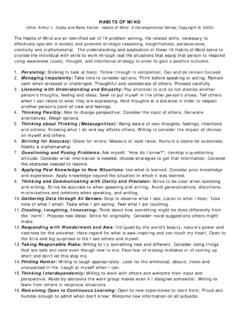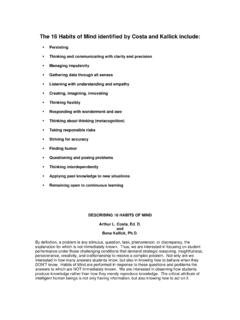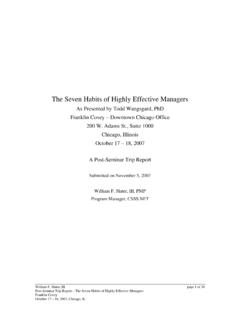Transcription of OPEN MIND, OPEN HEART - Leland Shields
1 OPEN MIND, OPEN HEARTThe Contemplative Dimension of the GospelTHOMAS KEATINGAMITY HOUSEA mity, New YorkCHAPTER TWOD imensions of Contemplative PrayerContemplative prayer is the world in which God can do anything. To moveinto that realm is the greatest adventure. It is to be open to the Infiniteand hence to infinite possibilities. Our private, self-made worlds come toan end; a new world appears within and around us and the impossiblebecomes an everyday experience. Yet the world that prayer reveals is bare-ly noticeable in the ordinary course of life and growth are founded on faith in our own basic good-ness, in the being that God has given us with its transcendent gift of being is our true Self. Through our consent by faith, Christis born in us and He and our true Self become one. Our awakening to thepresence and action of the Spirit is the unfolding of Christ's resurrectionin true prayer is based on the conviction of the presence of the Spiritin us and of his unfailing and continual inspiration.
2 Every prayer in thissense is prayer in the Spirit. Still, it seems more accurate to reserve theterm prayer in the Spirit, for that prayer in which the inspiration of the Spiritis given directly to our spirit without the intermediary of our own reflec-tions or acts of will. In other words, the Spirit prays in us and we traditional term for this kind of prayer is should distinguish contemplative prayer from contemplative life. Theformer is an experience or series of experiences leading to th abiding state1314 OPEN mind , OPEN HEARTof union with God. The term contemplative life should be reserved for theabiding state of divine union itself, in which one is moved both in prayerand in action by the mot of prayer is interior silence. We may think of prayer as thoughtsor feelings expressed in words, but this is only one of its forms. "Prayer,"according to , "is the laying aside of thoughts".
3 ' This definitionpresupposes that there are thoughts. Contemplative prayer is not so muchthe absence of thoughts as detachment from them. It is the opening ofmind and HEART , body and emotions our whole being to God, the Ulti-mate Mystery, beyond words, thoughts and emotions beyond, in otherwords, the psychological content of the present moment. We do not denyor repress what is in our consciousness. We simply accept the fact of what-ever is there and go beyond it, not by effort, but by letting go of whateveris to the Baltimore catechism, "Prayer is the raising of themind and HEART to God." In using this ancient formula it is important tokeep in mind that it is not we who do the lifting. In every kind of prayerthe raising of the mind and HEART to God can be the work only of the prayer inspired by the Spirit we let ourselves flow with the lifting move-ment and drop all reflection.
4 Reflection is an important preliminary toprayer, but it is not prayer. Prayer is not only the offering of interior actsto God: it is the offering of ourselves, of who and what we action of the Spirit might be compared to a skillful nurse teach-ing the adopted children of a wealthy household how to behave in theirnew home. Like waifs pulled in off the street and seated at the banquettable in the elegant dining hall, we require a lot of time to learn and prac-tice the proper table manners. Because of our earthy background, we tendto put our muddy feet on the table, break the chinaware and spill the soupin our laps. To assimilate the values of our new home, profound changesin our attitudes and behavioral patterns are required. For this reason wemay experience our nurse as constraining in the beginning and heavy onthe "don'ts". And yet she always seems to be encouraging in the midst ofcorrection; never condemnatory, never judgmental, always inviting us toamendment of life.
5 The practice of contemplative prayer is an educationimparted by the participation in this educational process is what Christian tradi-1. Evagrius, De Oratione 70 (PG 79, 1181C).Dimensions of Contemplative:Prayer15don calls self-denial. Jesus said, "Unless you deny your inmost self and takeup the cross, you cannot be my disciple!' (Mark 8:34) Denial of our inmostself includes detachment from the habitual functioning of our intellect andwill, which are our inmost faculties. This may require letting go not onlyof ordinary thoughts during prayer, but also of our most devout reflectionsand aspirations insofar as we treat them as indispensable means of goingto nature of the human mind is to simplify what it thinks a single thought can sum up an immense wealth of reflection. Thethought itself becomes a presence, an act of attention rather than of under-standing.
6 If we apply this principle to the person of Jesus, we can see thatthis kind of attention does not in any way exclude his humanity. Our at-tention is simply given to the presence of Jesus, the divine-human being,without adverting to any particular detail of his prayer is part of a dynamic process that evolves throughpersonal relationship rather than by strategy. At the same time a reason-able amount of organization in one's prayer and lifestyle advances the pro-cess, just as wholesome food and exercise help youngsters grow to of the first effects of contemplative prayer is the release of theenergies of the unconscious. This process gives rise to two different psy-chological states: the experience of personal development in the form ofspiritual consolation, charismatic gifts or psychic powers; and the experienceof human weakness through humiliating self-knowledge.
7 Self-knowledgeis the traditional term for the coming to consciousness of the dark sideof one's personality. The release of these two kinds of unconscious energiesneeds to be safeguarded by well-established habits of dedication to Godand concern for others. Otherwise, if one enjoys some form of spiritual con-solation or development one may inflate with pride; or if one feels crushedby the realization of one's spiritual impoverishment, one may collapse intodiscouragement or even despair. The cultivation of habits of dedicationto God and of service to others is the indispensable means of stabilizingthe mind in the face of emotionally charged thoughts, whether of self-exaltation or of to God is developed by commitment to one's spiritual prac-tices for God's sake. Service to others is the outgoing movement of theheart prompted by compassion. It neutralizes the deep-rooted tendency tobecome preoccupied with our own spiritual journey and how we are do-16 OPEN mind , OPEN HEARTing.
8 The habit of service to others is developed by trying to please Godin what we do and by exercising compassion for others, beginning withthose with whom we live. To accept everyone unconditionally is to fulfillthe commandment to "love your neighbor as yourself'. (Mark 12:31) It isa practical way of bearing one another's burdens. (Galatians 6:2) Refusingto judge even in the face of persecution is to fulfill the commandment tolove one another "as I have loved you" (John 13:34) and to lay down one'slife for one's friends. (John 15:13)Habits of dedication to God and service to others form the two sidesof a channel through which the energies of the unconscious can be releasedwithout submerging the psyche in the floodwaters of chaotic the contrary, when these energies flow in orderly fashion between thebanks of dedication and service, they will raise us to higher levels of spiri-tual perception, understanding, and selfless two stabilizing dispositions prepare the nervous system and bodyto receive the purifying and sanctifying light of the Spirit.
9 They enableus to discern thoughts and emotions as they arise before they reach thestage of attachment or quasi-compulsion. As independence from the thrall-dom of habitual thoughts and desires grows, we are able to enter into con-templative prayer with a quiet is the goal of self-denial. It is the nonpossessive attitudetoward all of reality, the disposition that strikes at the root of the false selfsystem. The false self is a monumental illusion, a load of habitual think-ing patterns and emotional routines that are stored in the brain and ner-vous system. Like programs in a computer, they tend to reactivate everytime a particular life situation pushes the appropriate button. The falseself even insinuates that its subtle purposes are religiously motivated. Genu-ine religious attitudes come from God, not from the false self. By meansof contemplative prayer the Spirit heals the roots of self-centeredness andbecomes the source of our conscious activity.
10 To act spontaneously underthe Spirit's influence rather than under the influence of the false self, theemotional programming of the past has to be erased and replaced. The prac-tice of virtue is the traditional term for erasing the old programs and writingnew programs based on the values of the in His divinity is the source of contemplation. When the pres-ence of the Divine is experienced as overwhelming, we are inwardly com-pelled to contemplate. Such was the situation of the apostles on MountTabor when they witnessed the glory of God shining through the humanityDimensions of Contemplative Prayer17of Jesus. They fell on their faces. Our experiences of God, however, arenot God as He is in Himself. God as He is in Himself cannot be experi-enced empirically, conceptually or spiritually. He is beyond experiencesof any kind. This does not mean that He is not in sacred experiences, butthat He transcends them.






